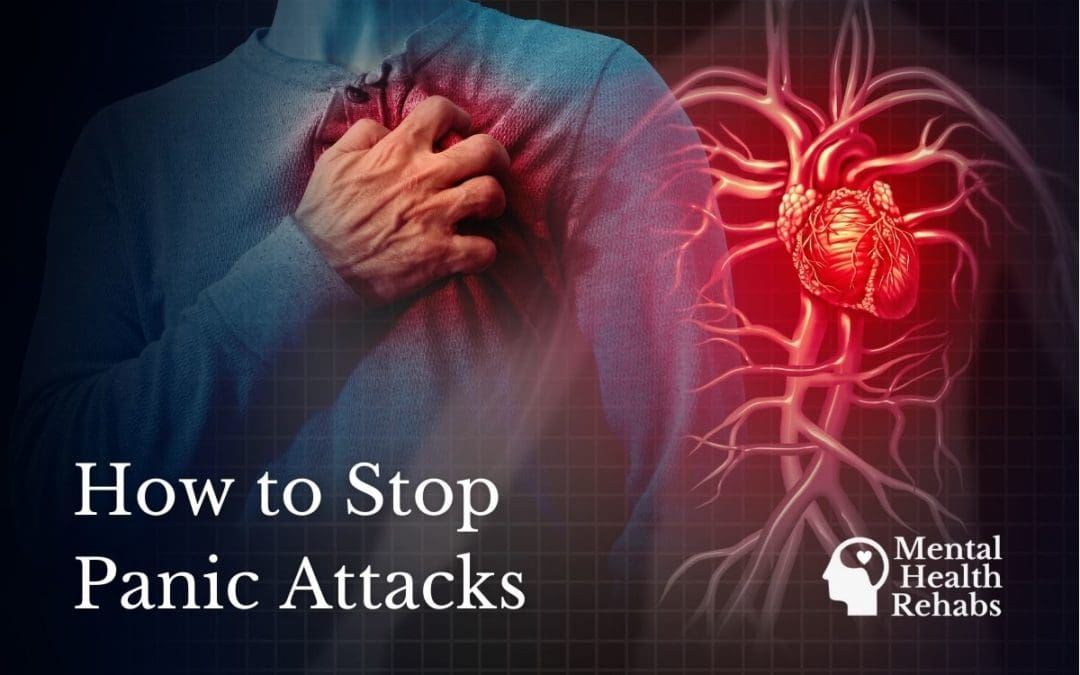Panic attacks are very common, with up to 13% of people experiencing at least one in their lifetime. Unfortunately, you cannot always predict when you’ll have a panic attack. But, having a plan to stop panic attacks fast and naturally is essential. Read on to learn ways to stop a panic attack, along with some common methods used to reduce anxiety.
How to Stop a Panic Attack
Panic attacks can be terrifying, but they are only momentary episodes of intense anxiety and are not life-threatening. Panic attacks usually last for several minutes and pass as quickly as they come. However, there are some things you can do to help reduce the number of panic attacks you experience and help yourself feel better when they do occur.
1. Practice Breathing Exercises
Breathing is tied directly to your state of mind because it controls your body’s response to fear. During a panic attack, you must slow down your breathing patterns to avoid exacerbating your body’s fight and flight response.
Breathe deeply through your nose, making your abdomen expand, hold your breath for 5 seconds, then slowly exhale through pursed lips. Repeat this cycle until you feel more centered.
People also try the 4-7-8 breathing method. This technique involves breathing in for 4 counts, holding the breath for 7 counts, and slowly releasing for 8 counts. Deep breathing can help slow down your body’s response to the panic attack and help you feel more at ease.
2. Use Aromatherapy
Consider using aromatherapy during anxiety-inducing situations. Aromatherapy involves using essential oils from plants to help promote relaxation and reduce stress. Lavender, for example, has been shown to help people who are feeling anxious or stressed. Lavender is a sedative, which means it can help relax the mind and body of those suffering from anxiety, insomnia, and stress-related conditions such as panic attacks.
If you’re looking for how to stop a panic attack naturally while it’s happening, turn to lavender oil. Hold a bottle of lavender oil under the nose and inhale slowly. To achieve similar effects, you can also try other essential oils like orange, chamomile, lemon, or bergamot.
3. Try the 5-4-3-2-1 Grounding Method
When you have a panic attack, it’s easy to feel detached from reality. The 5-4-3-2-1 method is a popular grounding technique and mindfulness method to help you focus yourself and step away from the source of stress. Here’s how to try this method:
- Look at five separate objects around you and think about each one for a bit.
- Listen for four different sounds and think about where they came from and what makes them distinct.
- Touch three objects focusing on their temperature and texture.
- Identify two different smells in the room.
- Name one thing you can taste in the moment.
4. Use a Mantra
A mantra is a word or phrase that can help you refocus and feel centered. Internally repeating a mantra is one of the best ways to stop a panic attack while it’s happening. The mantra can take any form as long as it serves you. As you focus on repeating the mantra, your physical response to the panic attack will slow, and you’ll be able to regulate their breathing. Some popular mantras to use for anxiety include:
- I am … fill it with an adjective of your choosing. For example, “I’m calm.”
- This, too, shall pass.
- It’s not about you.
- I am … and I deserve … fill it with affirmations. For example, “I’m strong, and I deserve calmness.”
- All is well.
- You are centered.
- I am here now.
5. Take a Walk
It seems a bit too easy, but walking and stepping away from a stressful environment can be extremely helpful in how to stop panic attacks. Moving around releases endorphins, which help relax the body and improve mood. Regular exercise can help reduce anxiety symptoms over time and eventually reduce the number or severity of your panic attacks. Also, if you can, take a walk outside and enjoy some sunshine. Spending time in nature can also help reduce stress and anxiety symptoms.
When to Seek Help
While panic attacks can be common, recurring attacks can be a symptom of a panic disorder. You may want to talk to a healthcare professional if your panic attacks are too frequent, are getting in the way of life, or do not improve with natural coping methods. A doctor can help you find long-term treatment to stop or prevent panic attacks. Luckily, with therapy, coping strategies, and in some cases medication, it’s possible to manage anxiety in daily life.
Sources:
https://www.ncbi.nlm.nih.gov/pmc/articles/PMC5143159/
https://www.sciencedirect.com/science/article/pii/S0944711319303411?via%3Dihub

